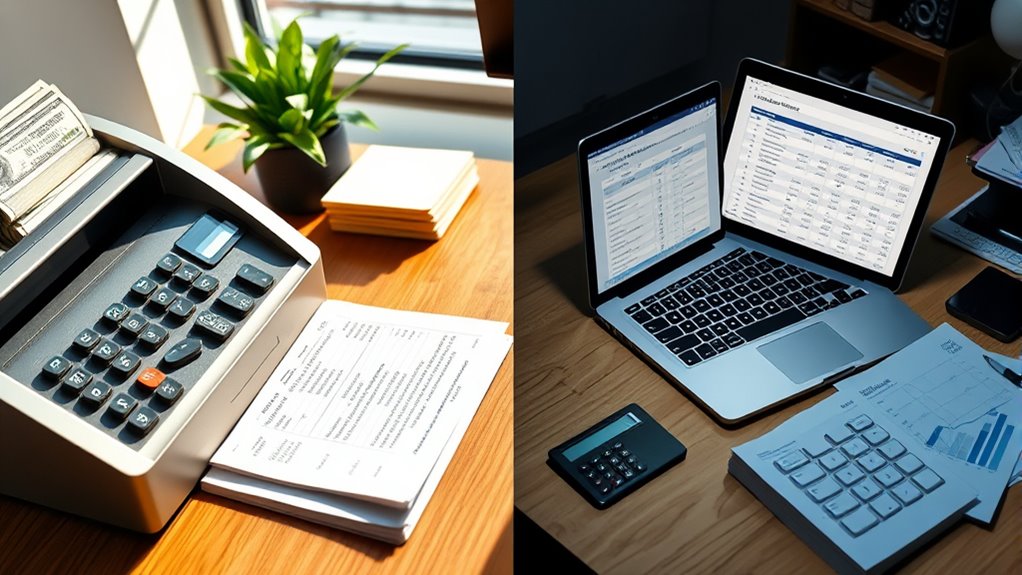Choosing between cash and accrual accounting affects your small business’s tax obligations. With cash accounting, you pay taxes on income when you actually receive it, which can help manage cash flow. Accrual accounting taxes you on income when earned, even if not received yet, potentially leading to higher tax bills sooner. Understanding these differences helps you plan ahead; continue to explore how each method impacts your specific tax situation.
Key Takeaways
- Cash accounting taxes income when received, delaying tax payments; accrual taxes income when earned, potentially accelerating tax liabilities.
- Small businesses under $25 million gross revenue can typically choose cash accounting, simplifying tax timing and cash flow management.
- Accrual accounting recognizes income and expenses regardless of cash flow, which may lead to paying taxes on unreceived income.
- Cash method helps with easier tax planning during slow periods by deferring income recognition until cash is available.
- The choice impacts tax liabilities, compliance requirements, and financial clarity, influencing overall tax strategy for small businesses.

When choosing between cash and accrual accounting, understanding their fundamental differences is essential for managing your finances effectively. This decision impacts how you record income and expenses, influences your inventory management, and shapes your financial statement analysis. Cash accounting records transactions when cash changes hands, making it straightforward and easy to track. It’s particularly appealing for small businesses because it provides a clear picture of your available cash at any moment. Accrual accounting, on the other hand, recognizes income when earned and expenses when incurred, regardless of when cash is received or paid. This method offers a more accurate reflection of your business’s financial health over time, especially when it comes to managing inventory and understanding your profitability.
Understanding the differences between cash and accrual accounting is key to effective financial management.
Your choice affects your tax implications directly. With cash accounting, you typically pay taxes when you actually receive income, which can help with cash flow management. This method delays tax payments until you have the cash on hand, potentially offering some relief during slow periods. However, it might not provide a complete picture of your liabilities, making it harder to forecast future tax obligations accurately. Accrual accounting, by matching income with related expenses, gives you a clearer view of your profitability and tax responsibilities at any given time. This approach can lead to paying taxes on income you haven’t yet received but have earned according to accounting standards, which might require careful cash flow planning.
For small businesses that hold inventory, accrual accounting is often preferred because it aligns with inventory management practices. It records inventory as an asset and recognizes the cost of goods sold when sales occur, providing a more accurate picture of profit margins. This method also facilitates financial statement analysis, helping you identify trends, evaluate performance, and make informed decisions. Cash accounting, in contrast, might distort your financial picture if you have significant receivables or payables, leading to potential misinterpretation of your actual profitability and financial position.
Additionally, tax regulations can influence your choice. The IRS allows small businesses with average annual gross receipts of $25 million or less to use cash accounting, but once your business surpasses this threshold, accrual accounting might become mandatory. This tax rule underscores the importance of understanding how your accounting method affects your tax liabilities and compliance. Ultimately, your decision should align with your business’s size, inventory needs, cash flow, and financial reporting goals to optimize your tax planning and financial analysis.
Frequently Asked Questions
How Does Each Method Affect My Business’s Taxable Income?
Your taxable income varies based on your accounting method. With cash accounting, you recognize revenue when you receive payment and expenses when you pay them, which can delay taxable income. Accrual accounting records revenue when earned and expenses when incurred, providing a clearer picture of profit and affecting your taxable income sooner. Understanding revenue recognition and expense timing helps you plan taxes effectively and choose the best method for your business.
Which Accounting Method Is Better for Seasonal Businesses?
Seasonal businesses should choose cash accounting for clarity and convenience. This method simplifies tracking cash flow, making it easier to manage inventory and analyze income during fluctuating seasons. Cash accounting provides a clear picture of actual cash in hand, helping you make timely decisions. Its straightforward approach suits seasonal sales spikes and slow periods, ensuring you stay on top of finances without complex calculations.
Are There Specific Industries That Prefer One Method Over the Other?
Certain industries prefer specific accounting methods based on industry preferences and business size. For example, small retail businesses often favor cash accounting for simplicity, while larger manufacturing firms tend to use accrual accounting for better financial accuracy. You should consider your industry standards and your company’s size when choosing, as industry preferences can influence compliance and tax reporting, helping you streamline operations and meet regulatory expectations effectively.
What Are the Record-Keeping Requirements for Each Method?
Did you know that over 80% of small businesses must follow standard bookkeeping standards? For cash accounting, you need to keep simple records of income and expenses with basic documentation like receipts and invoices. Accrual accounting requires more detailed documentation of receivables, payables, and adjustments to match revenue and expenses to specific periods. Both methods demand accurate, organized records to guarantee compliance and ease of financial analysis.
Can I Switch Accounting Methods After Choosing One?
Yes, you can switch accounting methods after choosing one, but you must follow IRS guidelines. To do so, you need to file the appropriate forms, like Form 3115, and adhere to specific switching procedures. Make sure you understand the timing and implications of the change, as the IRS requires consistency and transparency. Consulting a tax professional can help ensure a seamless transition and compliance with all IRS requirements.
Conclusion
Choosing between cash and accrual accounting is like picking the right map for your business journey. Cash keeps things simple, like a straight path, while accrual offers a detailed landscape, revealing every hill and valley. Your choice shapes your financial view and tax landscape, guiding your business through the terrain of profitability and compliance. Decide wisely, and you’ll navigate your financial future with confidence, steering clear of surprises and charting a course toward growth.









